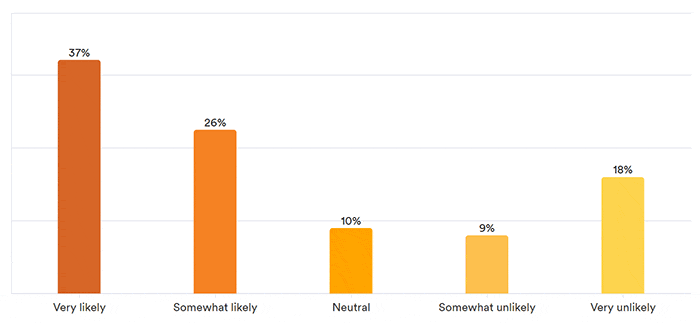According to the LANDTHINK Pulse results, 37% of our audience indicated that they were VERY LIKELY to buy landlocked property that has deeded access. Landlocked- the very word strikes terror in the hearts of potential buyers and landowners. A landlocked tract is “locked up” or surrounded by other properties and has no direct access to a public road. Without access, unless you arrive by boat or helicopter, the property is rendered virtually unusable. Without public access, the only way on or off the property is to cross land owned by someone else. Real estate agents often describe it as lacking ingress and egress from a public road. Whichever way one wishes to describe it, the meaning is the same. A property that has deeded or non-deeded access is still, by definition, landlocked if it doesn’t have direct access from a public road.
March Pulse Sponsored by
Last month, the March Pulse asked: How likely are you to buy landlocked property that has deeded access?
Landlocked property is more common than you think and exists for many reasons. In most cases, the reason comes down to the land being divided by its current owners or previous owners, or it was parceled in a way that resulted in a piece of land getting landlocked.
Access means the right to actually go on your property. Generally, access falls into one of three legal categories: public access, un-deeded access, and deeded access.
Public access is not complicated. When a parcel of land adjoins a public, government-owned roadway, you don’t have to go through another person’s property in order to get to your own land.
Un-deeded access means that you cross over a road or trail that’s owned by another land owner to get to your property. Typically, this is a road that has always been used to access the property, but a formal written agreement was never negotiated with the neighboring landowner to use the property.
A deeded access easement is a “nonpossessory” property interest and is the best way to secure right of way in order to access landlocked property without having to trespass on adjoining land. This is a legally enforceable right transcribed in a deed which, if drafted as an “easement appurtenant,” will automatically convey with the land it benefits when the land is sold or transferred. The right of way benefits the successors of the dominant estate and burdens the successors of the parcel over which the easement runs- known as the servient estate.
Even if you obtain deeded legal access from an adjoining land owner, the property is still landlocked. The value of the property will be encumbered by this fact up until it is assembled with a property that is not landlocked. The deeded access/easement does not remove its landlocked characteristic. The deeded access/easement simply gives you limited use to access the landlocked property but no ownership of the access/easement- therefore keeping it landlocked.
A landlocked property is considered insurmountable by some buyers and can be a deal killer. However, a contingency clause can be included in the purchase contract, giving the buyer the right to back out if a deeded access agreement cannot be negotiated successfully with an adjoining landowner. Un-deeded access can be a problem if the buyer is borrowing money to buy land. Lenders typically will not lend money when the intended security interest is landlocked.
The general principle in real estate law is that private property cannot be landlocked. There are federal and state laws in place that allow access to landlocked property even though direct access is not possible. States and their courts differ in how this principle is interpreted, and some scenarios exist that modify the rule. The principle can also get complicated when a buyer is seeking an easement over public land or land that is improved or occupied.
Dealing with a landlocked property is a tricky legal situation. For those contemplating purchasing a landlocked property, seek the advice of a real estate attorney.

The LANDTHINK audience expressed mixed opinions on how likely they are to buy landlocked property with deeded access. The results were all over the board, but the largest percentage (37%) indicated that they were VERY LIKELY to buy landlocked property with deeded access, followed closely by 26% of our audience, who said that they were SOMEWHAT LIKELY. A large percentage (18%) said that they were VERY UNLIKELY to buy landlocked property with deeded access. Only 10% were NEUTRAL and 9% said they were SOMEWHAT UNLIKELY to buy landlocked property with deeded access.
LANDTHINK would like to thank First South Farm Credit for sponsoring the March Pulse and for choosing an interesting question to pose to our audience. As a part of the national Farm Credit System, First South Farm Credit has been financing rural America since 1916. First South Farm Credit is a member-owned cooperative providing short, intermediate, and long-term financing and related services to full and part-time farmers, agricultural-related businesses and rural landowners in Alabama, Louisiana, and Mississippi. They are ready to help make your dream of land ownership or farming your own land a reality.
This content may not be used or reproduced in any manner whatsoever, in part or in whole, without written permission of LANDTHINK. Use of this content without permission is a violation of federal copyright law. The articles, posts, comments, opinions and information provided by LANDTHINK are for informational and research purposes only and DOES NOT substitute or coincide with the advice of an attorney, accountant, real estate broker or any other licensed real estate professional. LANDTHINK strongly advises visitors and readers to seek their own professional guidance and advice related to buying, investing in or selling real estate.











Add Comment